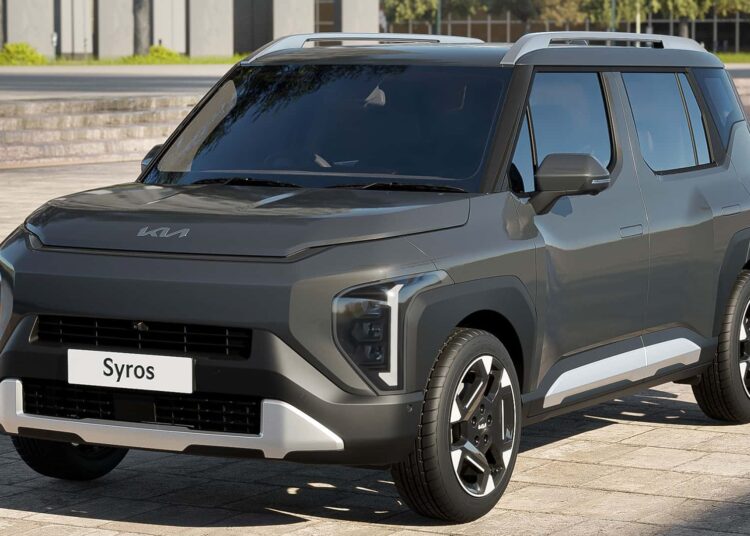Because automakers apparently can never have too many crossovers, Kia is launching the Syros in India. It sits above the Sonet in the local portfolio and looks pretty much like an EV9 toy car. However, beyond some styling cues, the two have nothing in common. For starters, the newcomer is offered only with combustion engines. It’s also much smaller, at just 3995 millimeters (157.2 inches) long. The electric SUV is a full meter (40 inches) longer.
We’d argue that the front design is undoubtedly the most striking angle of the Syros. Kia pushed the vertical headlights to the sides as it did on the Tasman. Since we mentioned the pickup truck, we can’t help but notice that the crossover’s nose also sticks out, perhaps more than it should. The odd look continues with the profile, where the plastic body cladding around the wheel arches reminds us of the Tasman’s “eyebrows.” An abrupt kink at the quarter glass stands out as well.
Photo by: Kia
The styling oddities continue at the rear, where the lower-mounted vertical taillights are installed at the extremities of the bumper. Another set of L-shaped lights sits up high, flanking the tailgate’s glass. There’s silver cladding all around, along with two-tone wheels as big as 17 inches. Higher-end versions get a dual panoramic sunroof.
Thanks to its boxy shape, it has an impressive cargo capacity of 16.4 cubic feet (465 liters). Rear legroom should be great for a vehicle in this class, courtesy of a generous wheelbase measuring 100.4 inches (2550 mm), which is about as long as the bigger Soul we get here in the US. Coincidentally, it’s just as wide as the funky crossover/hatchback mashup, at 70.8 inches (1800 mm), while being slightly taller, at 65.5 inches (1665 mm).
Power is provided by a turbocharged 1.0-liter gas engine that produces 118 hp and 127 lb-ft (172 Nm). It is routed to the front wheels via a six-speed manual transmission or a seven-speed, dual-clutch automatic gearbox. Alternatively, the Syros also comes with a 1.5-liter diesel that channels 114 hp and 184 lb-ft (250 Nm) to the road via a six-speed manual or a torque-converter automatic with the same number of gears. The versions equipped with the auto even get paddle shifters. A fully electric version will follow.

Photo by: Kia
While the exterior is definitely an acquired taste, the cabin is far more normal. Honestly, it actually looks like it belongs to another, more conventionally designed car. Kia has crammed nearly 30 inches of screen real estate by mounting a 12.3-inch digital instrument cluster, a touchscreen infotainment of the same size, and a five-inch panel for the climate settings nestled between the larger displays. Praise be, there are still a handful of physical buttons for accessing often-used functions.

31
Although it’s a diminutive crossover, the Syros is loaded with features. It has ventilated front and rear seats (yes, in the rear, too), wireless Android Auto and Apple CarPlay, and a wireless charging pad. The Syros gets a four-way powered driver’s seat, a sliding rear bench that folds 60:40, an electronic parking brake, 64-color ambient lighting, a folding rear central armrest, and an eight-speaker Harman Kardon sound system.
On the safety side, Kia India offers six airbags, a 360-degree camera, front and rear parking sensors, plus 16 driving aids – from lane keep assistance to adaptive cruise control (with stop & go). Syros will get better in time since the pint-sized crossover supports over-the-air updates.
Pricing has not been disclosed, but since the car competes with the $9,300 Skoda Kylaq, it should be dirt cheap. The Syros is based on the K1 platform, hence why you might have noticed some similarities with the Hyundai Casper and its electric Inster sibling.
Read the full article here

























Discussion about this post